
The Texas State Legislature meets for its Constitutionally-required regular session once every odd-numbered year for 140 days from roughly mid-January to the end of May. The Governor can call additional special sessions of thirty days at any point outside of the regular session. He may only take up legislative tasks included in the Governor’s call.
Many Texas taxpayers are unaware of exactly how to engage with this legislative process efficiently and effectively, despite having a sincere desire to advocate for pro-taxpayer policies, transparency, and responsible government.
Below are some of the key points to consider when beginning the process of engaging with the Texas State Legislative Process.
Who?
The lower chamber of the Legislature, the House of Representatives, consists of 150 members, each representing a specific district. Members of the House serve two-year terms. The upper chamber, the Senate, consists of 31 members, each representing a much larger district than House members. Senators serve four-year terms.
One of the first things anyone should tackle is determining who represents you in the two chambers of the State Legislature.
This can be done quickly by entering your information, like your home address, at this link here.
Once you have that determined, you can find more information about your Representative and Senator, including their mailing address, Capitol office location, district office location, office phone numbers, and email information on their page on the respective chamber’s website.
What?
In this legislative process, there are three types of legislation that it is important to be aware of: bills, joint resolutions, and amendments.
Bills, the most common piece of legislation, are what we usually think about when contemplating the process of law-making. House Bills (HBs) originate in the Texas House, and Senate Bills (SBs) originate in the Senate. HBs and SBs are the legal mechanism for creating new laws or amending current laws and only require a simple majority vote in both chambers and the Governor’s signature.
Joint Resolutions are the mechanism for amending the Texas Constitution. House Joint Resolutions (HJRs) and Senate Joint Resolutions (SJRs) are proposals for amending the Constitution, that must be passed by two-thirds of both chambers and then favorably voted for by citizens with a simple majority in a statewide election.
Amendments are smaller pieces of legislation that are typically brought to other pieces of legislation on the House or Senate floor during the debate on the main piece of legislation. Amendments can be anything from several pages long to simply adding or subtracting one word from a bill. It is important to keep an eye on the amendments that are offered on legislation, as amendments can have a substantial impact on the bill or resolution at hand.
Tracking Legislation
If there is a piece of legislation that is particularly important to you, you can use an online resource called Texas Legislature Online (TLO) to track the legislation and receive updates about its progress.
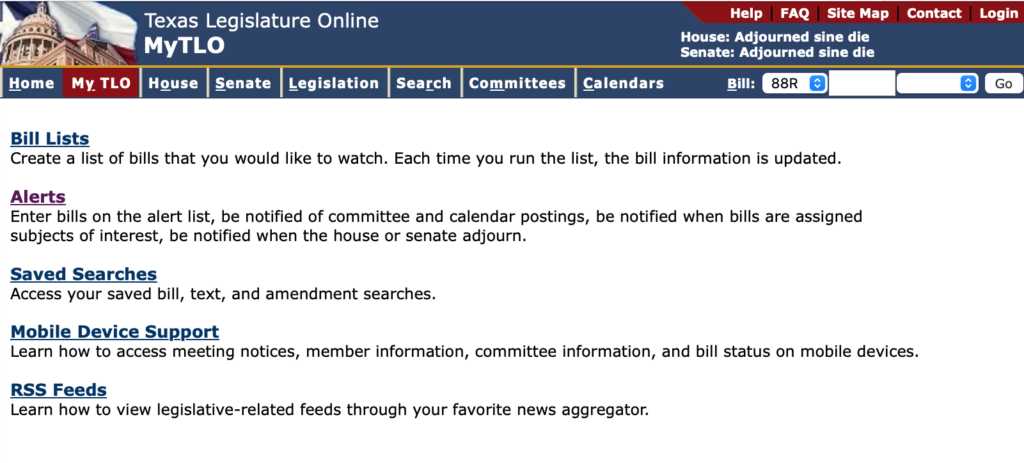
Simply go to TLO here and create an account. Once you have an account on TLO, you will be able to create custom bill lists, receive email notifications when actions are taken on bills, receive committee notices, and several other helpful tools to make your engagement with the Legislature more fruitful.
TLO is your friend…
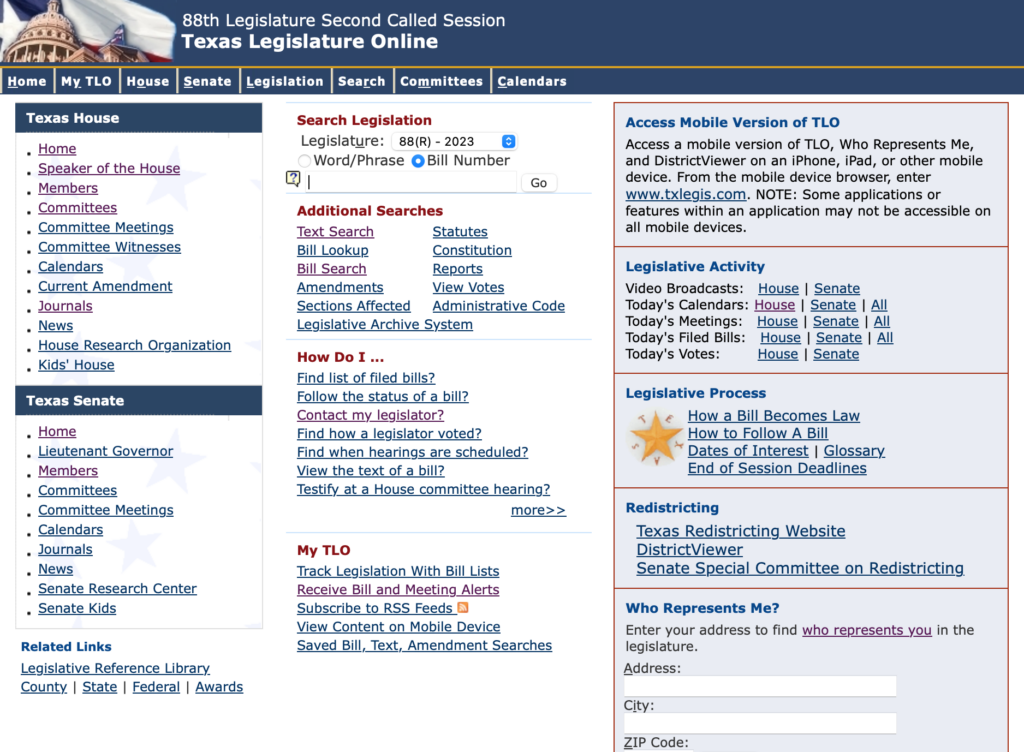
TLO is a resource that can provide more than just email alerts. Essentially it is a one-stop-shop for most of your Texas legislature needs: Find the status of a bill, see the results of votes taken in either chamber, find amendments proposed on bills, important dates, committee information, and access to the House and Senate websites for the live stream of both chambers and committee rooms.
Bookmarking TLO and using it routinely is highly recommended so you can keep yourself informed about the legislative agenda, proposed bills, and upcoming sessions.
Why?
Before engaging with any Representatives, Senators, and their staff, it is important to have clear and well-thought-through reasons for your positions on whatever bills or policies you wish to oppose or advocate for.
Writing out notes and testimony or developing a simple one-pager that can be digested easily and quickly are ideal, especially for shorter interactions with legislators and their staff.
Try to tie in personal experience and make your “why” clear.
When, Where, and How?
Visiting the capitol is relatively simple, even if it is your first time.
The Capitol building itself is open seven days a week, but the offices of Representatives and Senators are often not open unless the Legislature is in Session (either during their regular session in odd-numbered years or during a special session called by the Governor).
The easiest parking is the Texas Capitol Visitors Parking Garage, which is to the east of the Capitol building, located here.

The Capitol has four entrances: North, South, East, and West. Security is stationed at each one.
The Capitol Complex is quite large and is made up of the Capitol Building itself, as well as a large underground extension, which is where many of the offices and committee hearing rooms are located. Several different maps of the Capitol Complex can be found here, and the best map for inside the Capitol can be found here.
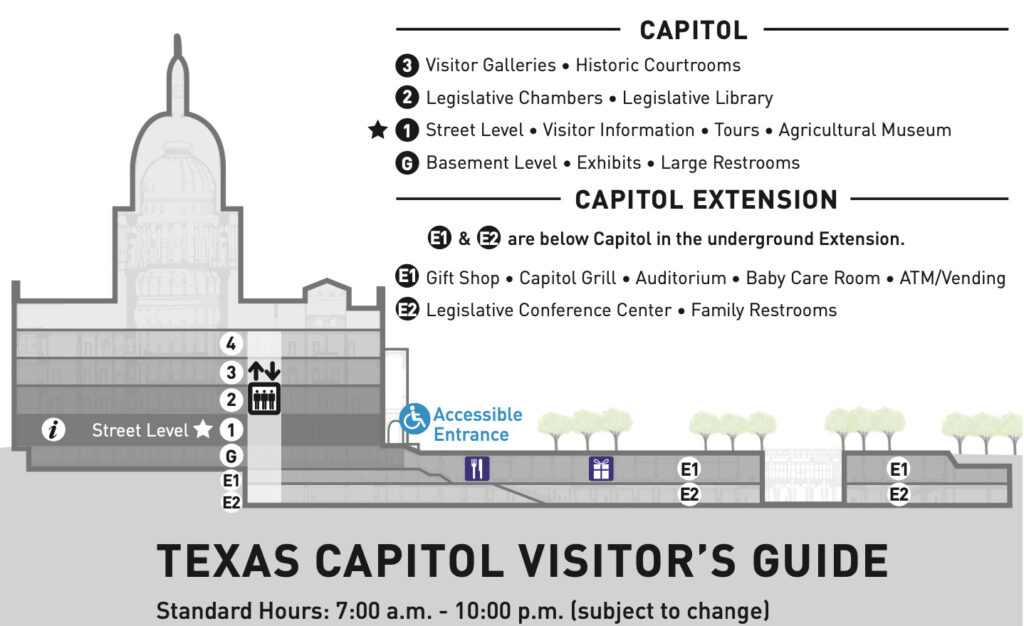
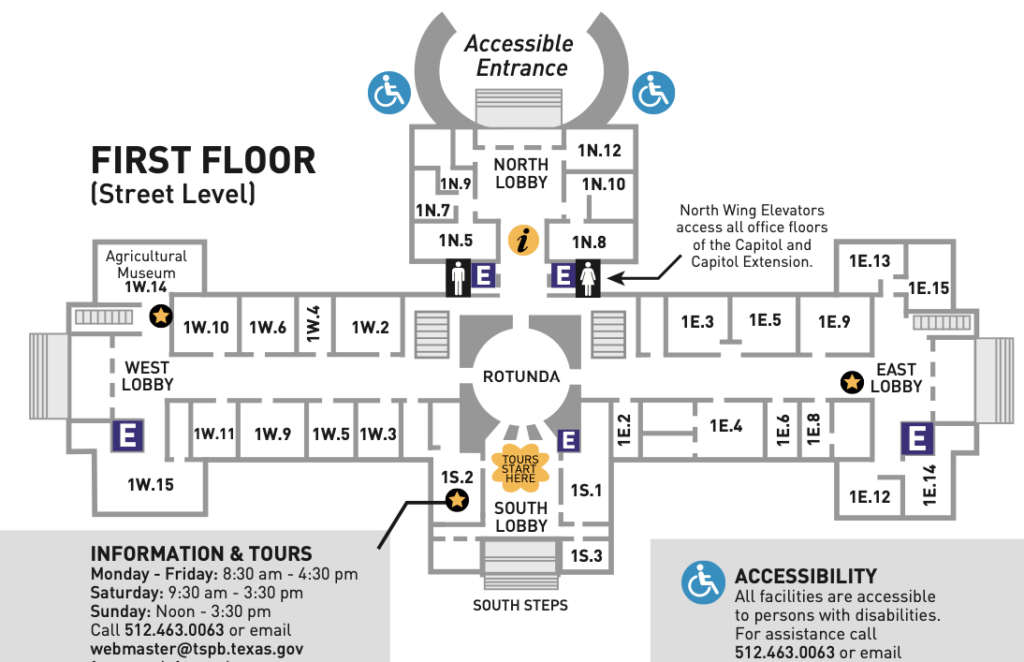

See to it that you advocate directly with your local Representative and Senator and their Staff. This can be accomplished through a variety of means, including calling, emailing, writing letters, and most especially, visiting the capitol office.
Most offices will be open for walk-in meetings during the Session, at least with staff. Attempt to schedule a meeting with the Representative or Senator to discuss the issues important to you. This can often be accomplished by calling or emailing their scheduler or Chief of Staff. Establishing a positive and respectful relationship with your legislators and their staff can only help your cause.
Committees
One of the most effective and important ways of engaging with the legislative process is participating in the committee process by giving oral or written testimony or by simply registering your position on a bill.
Planning ahead is essential. Be sure to know where the committee room is and what time the committee hearing begins as soon as possible. You can check on upcoming committee meetings at the link here.
Once you arrive at the Capitol, you will need to register your position on the legislation beforehand and register to testify if you choose. These processes can be slightly different between the House and the Senate.
The House Procedures:
The House has a simple, five-step registration process that can be accomplished either at a kiosk in the hallways of the Capitol Extension or on a personal device such as your phone or laptop at the link here. The link will only work if you are connected to the Capitol’s Wi-Fi.
More information about the House Registration can be found here.
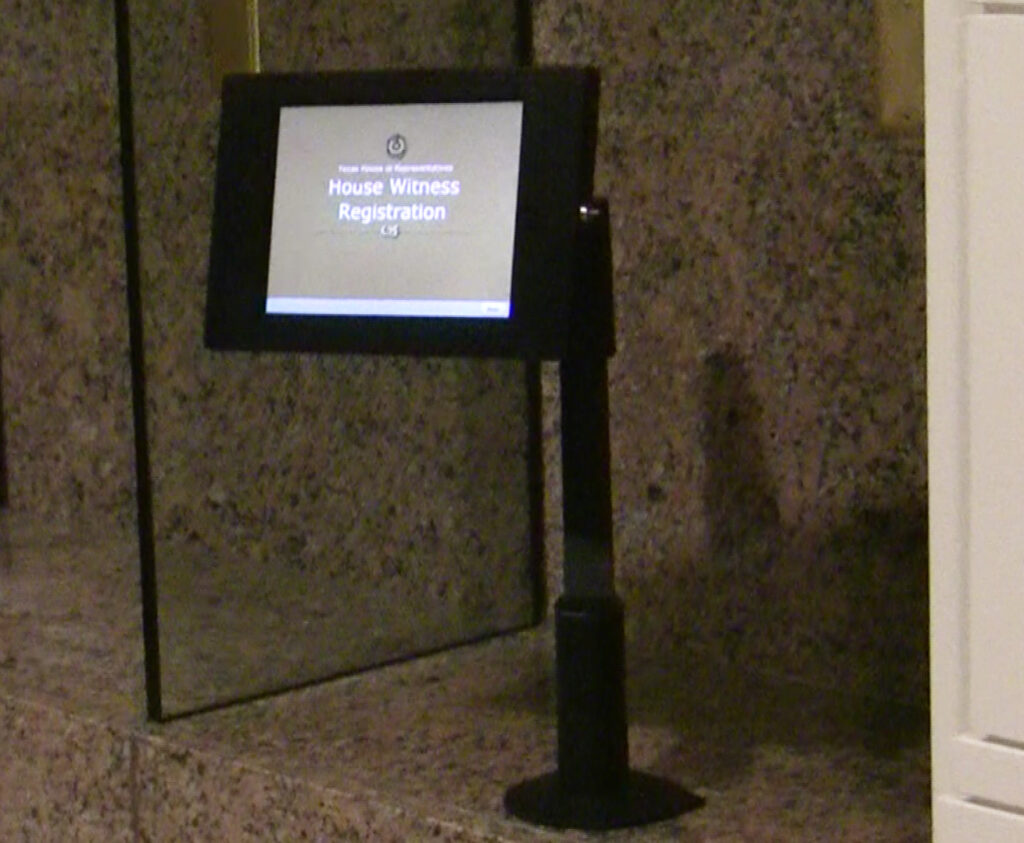
The Senate Procedures:
The Senate’s registration process can differ somewhat.
Begin your process at one of the many kiosks in the Capitol Extension hallways. If the bill you wish to testify on is listed on the kiosk, then you can proceed as you would for a bill being heard in a House Committee.
If the bill is not listed on the kiosk, then the committee that the bill is being heard in uses a paper registration process. The paper cards for registration and testimony will usually be found either at the back of the committee room or with the Committee Clerk at the front of the room. Follow the instructions on the paper card and return it to the Clerk.
Testifying in Committee for either chamber:
Regardless of which chamber’s committee you are testifying in, here are some pointers that will apply to both:
Know the bill number that you are testifying on ahead of time, and be sure to register “For,” “Against”, or “Neutral/On” the bill in question.
If you elect to actually testify on the legislation, be sure to be available at any time to be called up. The Chair of the Committee determines the order in which bills will be heard, in addition to the order testimony on those bills will be heard.
Sometimes, testimony will be limited to a certain amount of time for each person, so be aware of any time constraints. Always begin your testimony by stating your name, who you represent (yourself or an organization, or both), and your position on the bill, and finish your testimony with a request that members of the committee support or oppose the bill (depending on your position).
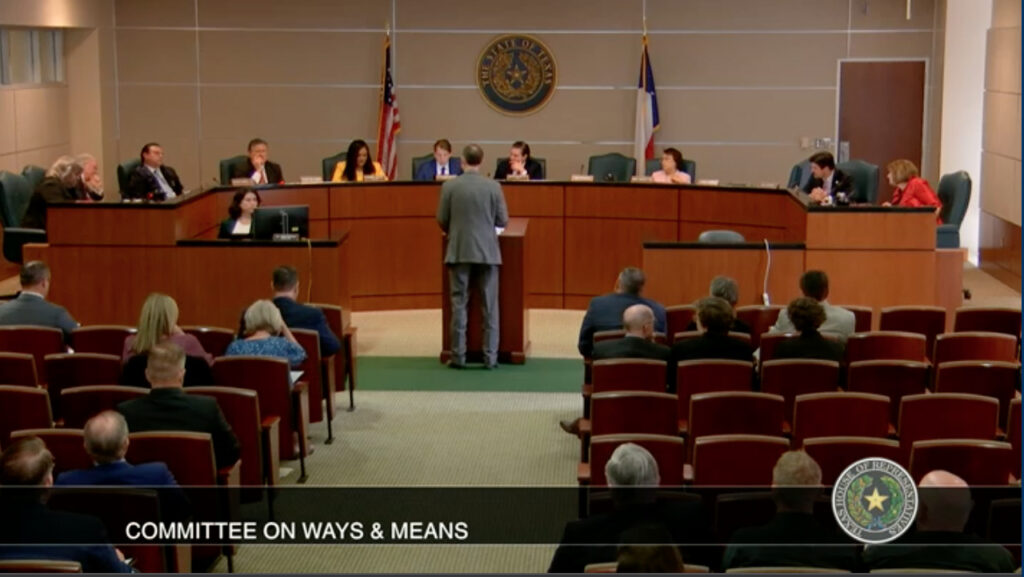
Remember to always be respectful, clear, concise, and truthful.
Advocacy outside the Capitol
Lastly, advocacy and engagement with the legislative process doesn’t just happen directly with Legislators or within the Capitol building itself. Much can also be accomplished by being involved in, or supporting groups, initiatives, and movements outside the pink dome.
Find groups that will actually fight for conservative policies at all levels of government (and not just pay lip service to those ideals) and support them with your time and money.
One of those groups is Texans for Fiscal Responsibility (TFR).
TFR has consistently fought for pro-taxpayer reforms, responsible government, and conservative policies since our inception in 2007, and we will continue to do so.
We have an abundance of resources, such as our Texas Fiscal Responsibility Index that shows the scores and details the votes taken of all State Representatives and Senators at the end of each regular session so voters can hold them accountable for their actions, articles covering the Legislature and current events, Research, “Explainers,” and more to help inform, illuminate and equip Texans to fight for sound government.
Fight the Good Fight
Remember that your engagement is essential for a vibrant and responsive government. So, seize these opportunities and help for policies and laws that will promote prosperity in the Lone Star State.
Texans for Fiscal Responsibility relies on the support of private donors across the Lone Star State in order to promote fiscal responsibility and pro-taxpayer government in Texas. Please consider supporting our efforts! Thank you!
Get The Fiscal Note, our free weekly roll-up on all the current events that could impact your wallet. Subscribe today!




